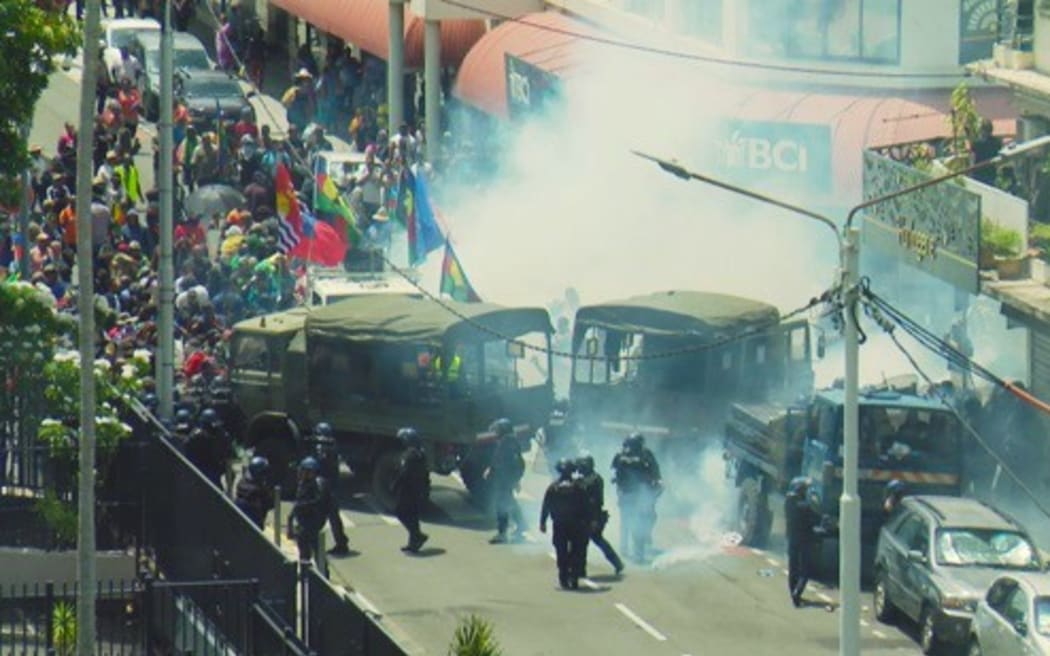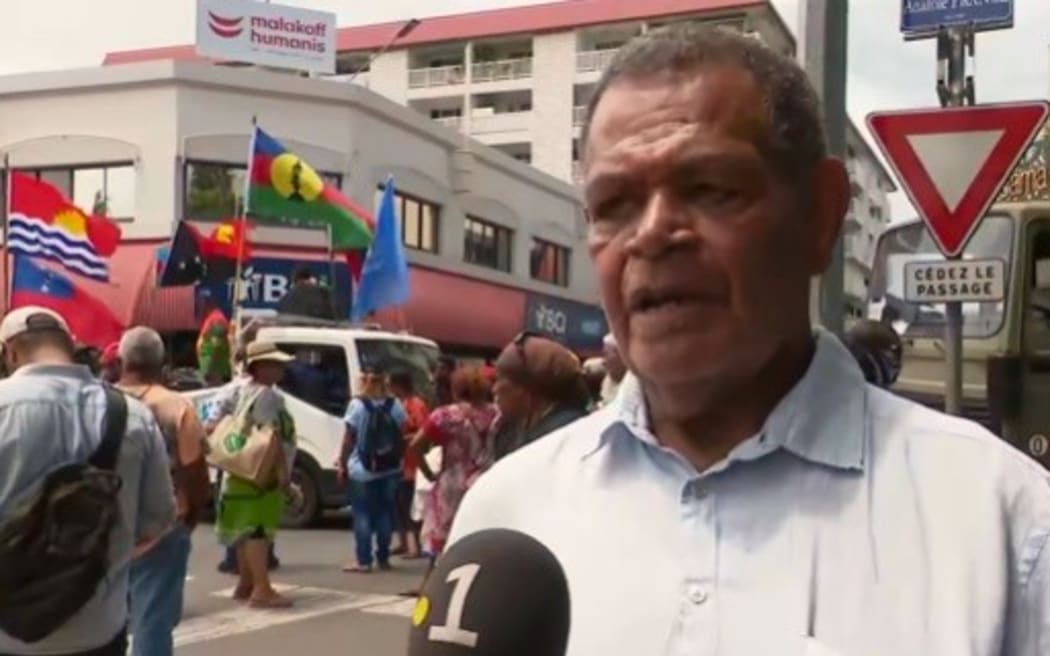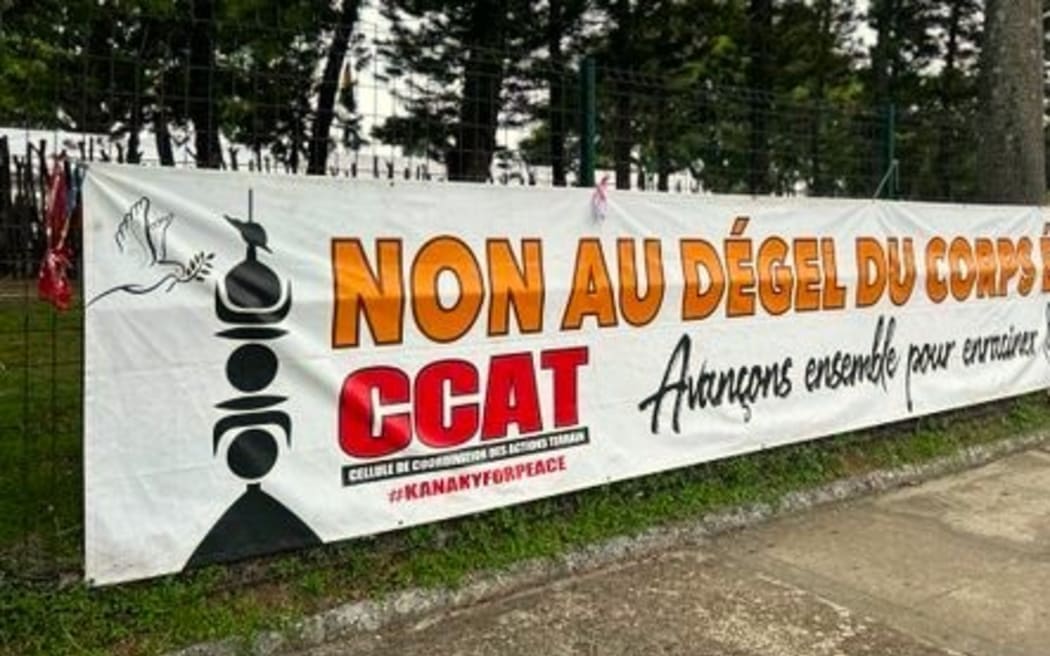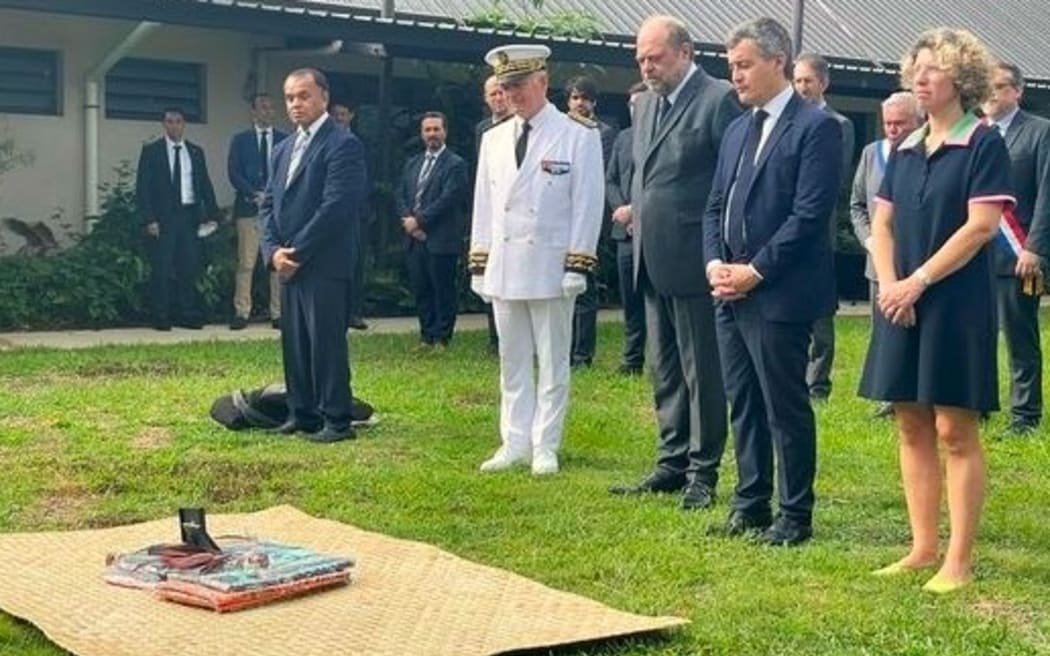Pro-independence militants and protesters clashed with police in downtown Nouméa this week as New Caledonia hosts three French government ministers.
The crowd — an estimated 2000 according to organisers, 500 according to police — had been called on Wednesday to voice their opposition to a French-planned constitutional amendment process which would include modification of New Caledonia’s electoral roll for local elections.
As the three French ministers were on official calls in various places, in downtown Nouméa police fired teargas to disperse the crowd.
Five policemen were reported to have been injured, including one seriously hit by rocks, the French High Commission stated, adding five protesters had been arrested shortly afterwards.
The protest had been organised by Union Calédonienne’s self-styled “field action coordinating cell” (Cellule de Coordination des actions de terrain, CCAT), which consists of trade union USTKE and UC’s close ally, the Labour Party.
UC is the largest single party within the mostly indigeous Kanak socialist and nationalist front (FLNKS).
Later on Wednesday, the crowd was dispersed and it moved out of downtown Nouméa.
“It’s completely out of the question to ‘unfreeze’ the electoral roll,” UC president Daniel Goa, who was part of the crowd, told local media.
Pro-France politician Nicolas Metzdorf said in a statement: “This kind of call to hatred, directly from UC . . . must stop. Violent protests will not halt the electoral roll being ‘unfrozen’.”

Regular visitor
French Home Affairs and Overseas Minister Gérald Darmanin, who is now regarded as a regular visitor, arrived on Tuesday and this time was flanked with his newly appointed “delegate” Minister for Overseas, Marie Guévenoux, as well as French Justice Minister Eric Dupond-Moretti.
This is Darmanin’s sixth visit to New Caledonia in the past 12 months.
In a polarised context, many attempts by Darmanin to bring all parties around the same table in order to all agree on a forward-looking agreement have so far failed.
His previous visits were focused on attempting to bring about inclusive talks concerning New Caledonia’s political future which could involve an amendment to the French Constitution.
The amendment contains sensitive issues, including a revision of New Caledonia’s list of eligible voters at local elections, with a 10-year minimum residency period for any French citizen to be able to cast their vote.

FLNKS’ 2 major wings — diverging views
While the two main components of FLNKS (UC and PALIKA-Kanak Liberation Party) last weekend held separate meetings and announced diverging approaches vis-à-vis France’s proposed reforms, the pro-independence umbrella FLNKS has now rescheduled its Congress for March 23.
Even though most local parties in New Caledonia have started to exchange views on the sensitive subject, one of the main components of the pro-independence front FLNKS, the largest party Union Calédonienne (UC), has so far refused to take part in the bipartisan round tables.
After convening UC’s steering committee in Houaïlou, UC vice-president Gilbert Tyuienon earlier this week told a press conference the party intended once again to hold a series of actions through its recently revived “field action coordinating cell” (CCAT).
“We have asked [the CCAT] and its young members to take all steps on the field,” he said.
The thinly veiled threat materialised on Wednesday with CCAT militants, including members of the Labour Party and union USTKE, deploying banners opposing to the planned Constitution review being placed in the capital Nouméa, also sometimes with roadside burning of tyres in the suburban town of Mont-Dore.
Tyuienon also claimed that UC considered French-promoted political talks were “a failure” and labelled Darmanin’s travel to New Caledonia as “yet another provocation” and that the proposed text was potentially “destabilising [New Caledonia’s political] balances”.
“There is a formal opposition from UC to meet the ministers . . . we know who is responsible for this situation,” Tyuienon told reporters.
He said UC now demanded that the whole French constitutional amendment project be scrapped altogether — “or else we’re heading for big trouble”.

More nuanced views
PALIKA, after its own meeting last weekend, expressed more nuanced views: “We are involved in every dialogue venue regarding all the document drafts that have been put on the table,” spokesman Jean-Pierre Djaïwe told a press conference on Monday following its extraordinary general assembly in Canala.
“We can only regret that every time we are taking part in discussions, not all of New Caledonia’s political groups are represented. Because our objective, from PALIKA’s point of view, is to reach an agreement comprising all political parties,” he said.
Djaïwe, however, said the current draft document “sided too much in favour of the (pro-French) parties”, which could “be detrimental to the conclusion of an agreement between local players”.
He indicated that PALIKA’s current stance would remain valid at least until the “end of March” — when the FLNKS Congress takes place — and “after that, it will decide on its strategy”.
Over the past months, PALIKA and other components of the pro-independence umbrella have consistently advised their members not to take part in UC’s CCAT-organised actions and protests.
However, Darmanin has already indicated that he did not intend to touch New Caledonia’s institutional and political future as he wanted “the neutral and impartial [French] State to only talk with local political parties once they have reached an agreement”.
His schedule did not seem to include New Caledonia’s nickel industry crisis either, following the announcement last week that one of its three major companies, in Koniambo (KNS), will now be placed under “care and maintenance” mode (effectively mothballed by its major Anglo-Swiss financier Glencore).
Glencore earlier this week confirmed it would withdraw after a six-month “transition” period, leaving more than 1200 workers and another 600 sub-contractors without work.
The company, which owns 49 percent of Koniambo’s stock, justified its move saying this operation over the past 10 years had never been either profitable or sustainable and had accumulated losses to the tune of a staggering 14 billion euros.

Climate change agenda
Instead, Darmanin’s official agenda includes visits to sites affected by climate change and coastal erosion as well as announcements regarding the reinforcement of road safety (with the introduction of new latest-generation speed radars thanks to a 200,000 euro grant, to reduce the high number of road accidents and fatalities in New Caledonia.
Justice Minister Dupond-Moretti said his visit was focused on meeting the local judiciary and bar, but also New Caledonia’s custom and traditional justice players.
He will also officially open a new detention centre in Koné and provide more details regarding the construction of a 500 million euro new jailhouse in the suburbs of Nouméa, which is due to replace the overpopulated and ageing Camp-Est prison, where living conditions for inmates have frequently been denounced by human rights organisations.
After his stay in New Caledonia (February 21-22), Darmanin’s Pacific trip is also to include this time a stopover in Australia later this week (February 23-24), where he is expected to meet cabinet ministers to talk about Pacific “regional cooperation” between the two countries, as well as about this year’s Olympic Games in France.
This article is republished under a community partnership agreement with RNZ.
Article by AsiaPacificReport.nz




